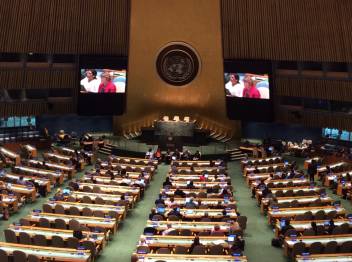 This week I’m in New York at the follow up and review session of the intergovernmental meetings for the Sustainable Development Goals.
This week I’m in New York at the follow up and review session of the intergovernmental meetings for the Sustainable Development Goals.
Older women and men across the globe are calling for a follow up, implementation, review and appraisal process which is accountable to people of all ages and in which they can actively contribute and respond.
Ageing cuts across all SDG topics
I was lucky to speak on behalf of the Stakeholder Group on Ageing and in the interests of over 800 million older people worldwide (full statement here).
Ageing is so important in the SDG process as it cuts across all topics of concern. Women over the age of 50 account for 22% of the world’s women; 44.6% of people over 65 are likely to have disabilities; three quarters of non-communicable diseases occur in the over 60s age group; today’s youth are tomorrow’s older people.
What we have learnt from the Millennium Development Goals is quite simply that they side-lined older people with the result that levels of poverty amongst older age groups are now unacceptably high.
Visibility, inclusion and factoring in age is essential. Archbishop Desmond Tutu has just released a video for our Action All Ages Day, which says: “I am Desmond Tutu, I and 83 years old, I am for all ages and I count.”
Our recommendations
We have been working on a number of recommendations for the follow up and review to ensure older people are included.
These are:
- Put in place cross-cutting lifecourse indicators across the goals and targets to pick up shared issues of ageing, gender, disability and other issues and review them through ongoing and open statistical dialogues.
- Investment in national statistical capacity and proper financing to support both improved life course statistics and innovative programmes.
- Regular dialogue and review at national, regional and global levels to strengthen information sharing and collaboration.
- All UN agencies to incorporate ageing actively in their work and research and publish what they know, and what they are doing.
Participation
Sustainable development will not be achieved by 2030 without the conscious and intentional inclusion of the ever increasing number of older people, who are also living longer.
These older people are not only experiencing and adjusting to the impacts of climate change, urbanisation, inadequate health services and humanitarian crises, but are also struggling against ageism.
It must be recognised that older people and people with disabilities are also vibrant and productive members of society. They participate in all walks of life and contribute to the economic and social health of their communities.
Older people and people with disabilities should not be viewed primarily as vulnerable and dependent, or be considered victims or passive recipients of services, care and protection.
While the SDG intergovernmental process has provided an important and strategic platform to address ageing issues at the global level, the opportunities and challenges of population ageing have yet to be fully explored, understood and incorporated in national development programmes and at the regional levels.
Investment to “leave no one behind”
Achieving the SDGs means eradicating extreme poverty for all and leaving no one behind. Poverty is endemic amongst older age groups, with disability being a compounding factor.
Current responses to ageing and disability too often result in lower rates of labour force participation, social inclusion and discrimination which in turn exacerbate chronic poverty, passing it on through generations.
Income security, access to health services, opportunities for employment and learning, safe transport and housing and freedom from discrimination and violence are fundamental to a secure and dignified old age.
Financial investment in the implementation of the SDGs must prioritise policy approaches and programmes, including social protection floors, to ensure these are delivered.
Measurement
It is not possible to measure impact without data.
“Leaving no one behind” means that special attention must be given to measuring the outreach to and impact of the commitments made on marginalised and vulnerable people, including older people and people with disabilities.
Data are not yet fit for purpose to measure impact on populations as they age. Improved disaggregated data, by age across the lifecourse as well as by other variables, from official statistical bodies and non-traditional sources, are required.
We welcome the data revolution. The data we collect must improve the lives of all, from the cradle to the grave. And the data collected nationally and used globally must make visible those who are currently invisible.
Find out more about our work to ensure that older people are included in the Sustainable Development Goals.
